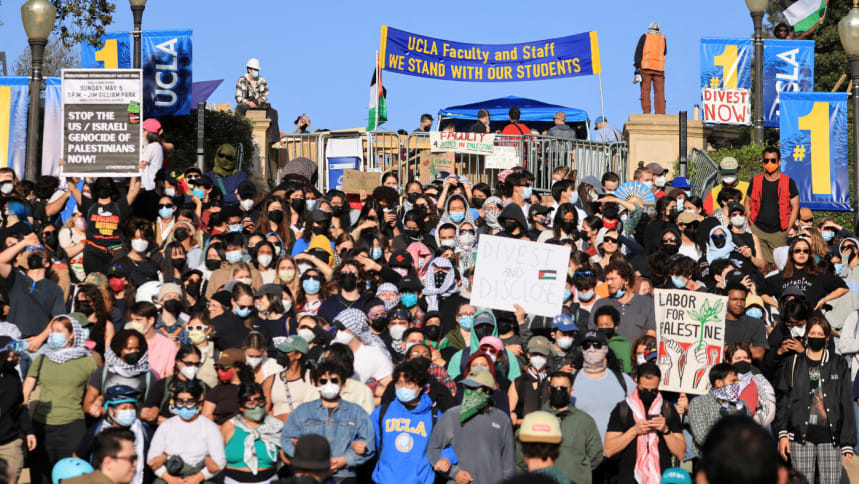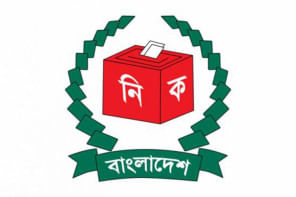Pro-Palestine protests in US campuses: The state of Bangladeshi and other international students

In universities across the United States, students, alumni, and even faculty members are adamantly protesting against the war in Gaza. The purpose of these protests has been to bring light to the complicity of these universities in "funding", either directly or indirectly, Israel's continued occupation. On the campus grounds where these students have set up solidarity camps, police officers have intervened, and even attacked and arrested hundreds of students demanding that these universities hold themselves accountable.
"Disclose, divest. We will not stop, we will not rest" has become a chant heard all throughout the solidarity camps at Columbia University.
But with the violence and the threat of arrest, suspension, or even expulsion these students face, their safety becomes a worry. For international students, in particular, these worries are heightened. The desire to fight for a humanitarian cause is of course there for these students, but their concerns are valid as well.
At Columbia, a university with a rich history of students protesting against the US's injustices across the world, things have escalated to the point of wanton police violence. The Daily Star reached out to Aandishah Tehzeeb Samara, a second-year PhD student at Columbia, for further details.

"The sensitivity of our legal status is one of the biggest reasons why international students have been scared to participate in these protests. It's not just the students, even the international faculty members have been really scared to raise their voices. The whole situation got to the point where the police would arrive and even attack the students while mediapersons were restricted from entry," she says. "However, the protesters are organised in a way to ensure that American students, especially white students, are on the frontline, especially at times when arrests are being made."
The problems faced by international students and faculty members at these universities don't just begin and end there. According to Aandishah, threats of suspension from Columbia's authorities are quite frequent; they have even gone as far as suspending many of their Palestinian students, some of whom weren't even participating in the protests at any level.
"Columbia's actions against the students have been very systematic. While not all of us participating in the encampment protests got suspended, we are still being threatened with suspension or worse if we don't clear out the encampments. Some of the first people to get suspended have been Palestinians. Many of them weren't even in the city when they got their suspension letters. They even placed New York City Police Department (NYPD) officers at every single entry point in the university and when they look at us international students, they do everything to make you feel unsafe and unwelcome."
Nahaly Nafisa Khan, another PhD student at Virginia Tech, recounts the events that occurred at her university.
"Protests against this occupation have been going on since October of last year, but the encampment at New York University (NYU) and Columbia drove the student organisations in support of Palestine in Virginia Tech to take action and set up an encampment. The protests themselves were peaceful but within a matter of days, we started getting reports of law enforcement officers threatening to take action against them. On April 29, the state police arrived and caution-taped the whole encampment spot and, within the next few hours, arrested many of the students and tasered this one student who wouldn't comply with them."

While the treatment by the police paints a dire image in itself, another thing of note is Virginia Tech's treatment of international students, particularly Palestinians, who reached out to the Principal of Virginia Tech in the hope of a statement against the atrocity. "In reply to all those emails by the Palestinians, the secretary wrote a one-sentence reply that read 'Thank you for your concern,'" Nahaly says, once again raising the question of where the allegiance of the university authorities lies if they are so adamant about their refusal to listen to their own students.
The undeniable hostility, ostensibly, spreads across most colleges in the US, but the one thing that fights back against it happens to be the community of protestors who all work together every step of the way. At Dartmouth, Adwiteeya Paul, a first-year undergraduate student, sheds light on the organised effort to keep international students away from harm.
"The Palestine solidarity coalition and other similar student organisations at Dartmouth have decided among themselves who are okay with being arrested and who are not. The international students try to stay with the group that would rather not get arrested, because of the repercussions it might cause," Adwiteeya says, adding that over 90 students and a few professors have already been arrested. Most recently, state troopers have also arrived to arrest students, an act which has driven the student workers union at Dartmouth to strike until the college President resigns. Amidst all this, international students attempt to keep themselves away from the centre of the encampment but are part of the movement, nonetheless.
The threat of violence and suspension may largely be uniform, but one group will clearly suffer more dire consequences than the other. At Yale, Nawal Naz informs The Daily Star about the presence of international students in the ongoing protests.
Nawal says, "International students (from Yale) are taking part in these protests, and one of them even got arrested and it's highly likely that they will be deported. But most international students are not at the front lines – they are being extra careful."
They also go on to add that there is an increased risk of pro-Israel "counter-protestors" doxing the identity of international students. "There is definitely more risk involved if you're an international. Many of the students I've spoken to even choose not to attend for their own safety."
Very recently, police have forcefully cleared out all the encampments at the University of California, Los Angeles (UCLA). They have made over 130 arrests, almost all of whom were students. Currently, The Daily Star is unable to confirm how many of them were international students, but the threat that looms over these young people asking for universities to not fund a genocide or war, is very much there. Yet despite their entire futures being on the line, the students seem to have no intentions of backing down.
The writer is a contributor of Campus, The Daily Star.

 For all latest news, follow The Daily Star's Google News channel.
For all latest news, follow The Daily Star's Google News channel. 








Comments